 In recent months, 32 companies at the RDM site in the port of Rotterdam have been testing a new green energy platform called Distro which is working with solar panels and a battery and the users trade energy they have produced themselves in a local market.
In recent months, 32 companies at the RDM site in the port of Rotterdam have been testing a new green energy platform called Distro which is working with solar panels and a battery and the users trade energy they have produced themselves in a local market.
This is the first time in the world that blockchain technology, artificial intelligence and high-frequency commodity trading have been combined in a single platform. The successful trial shows that it is possible to coordinate supply and demand in local markets 48 hours in advance through a platform on the basis of fair prices and transparent trading agreements.
The Distro platform was developed by S&P Global Platts and Blocklab, a subsidiary of the Port of Rotterdam Authority that specialises in blockchain solutions. The new initiative helps companies in the port to reduce energy costs by making better use of locally produced electricity and by smoothing peaks in demand on the electricity grid. All this fits in with the climate goal of establishing a carbon-neutral port by 2050.
Testing this summer demonstrated that the platform works, and the coming months will be used to get it ready for commercial use.
A pilot project was conducted in the Innovation Dock, owned by the Port Authority, which houses innovative entrepreneurs. The Port Authority used Distro to operate its own ‘micro-market’ of 32 users, as well as a roof full of solar panels and a battery to store the energy produced. The Artificial Intelligence predicts the consumption and production patterns of individual electricity consumers, and trades kilowatt hours on the platform on the basis of those forecasts. The price of electricity fluctuates with changes in supply and demand. Batteries responding to price buy and store excess on-site solar energy that is generated when consumption levels are low, to re-sell it to users when solar generation is low.
 The results of the green energy platform pilot test include a 92% local consumption of renewable energy and a 20% increase in return on investment for the battery. Additionally, the pilot demonstrated a 14% improvement in revenues for locally produced renewable energy, while lowering average prices for consumers. In addition, trading between the participants means that a ‘micro-market’ places less of a burden on the regular electricity grid. In turn, that means that the Port of Rotterdam Authority can reduce the capacity of the connection to the network and save costs by 25%.
The results of the green energy platform pilot test include a 92% local consumption of renewable energy and a 20% increase in return on investment for the battery. Additionally, the pilot demonstrated a 14% improvement in revenues for locally produced renewable energy, while lowering average prices for consumers. In addition, trading between the participants means that a ‘micro-market’ places less of a burden on the regular electricity grid. In turn, that means that the Port of Rotterdam Authority can reduce the capacity of the connection to the network and save costs by 25%.
The platform combines the capabilities of high frequency trading, with a blockchain environment that provides security for transactions, identity management and market rule compliance. In the coming months, the software used in the pilot will be prepared for commercial use. “This pilot project is good for everyone: not only are energy prices fairer and more transparent, the costs of sustainable energy are reduced for clients. This is a solution that will help to achieve the goal of a carbon-neutral port,” said Nico van Dooren, the Director New Business & Portfolio Management at the Port of Rotterdam Authority.
Share on:



